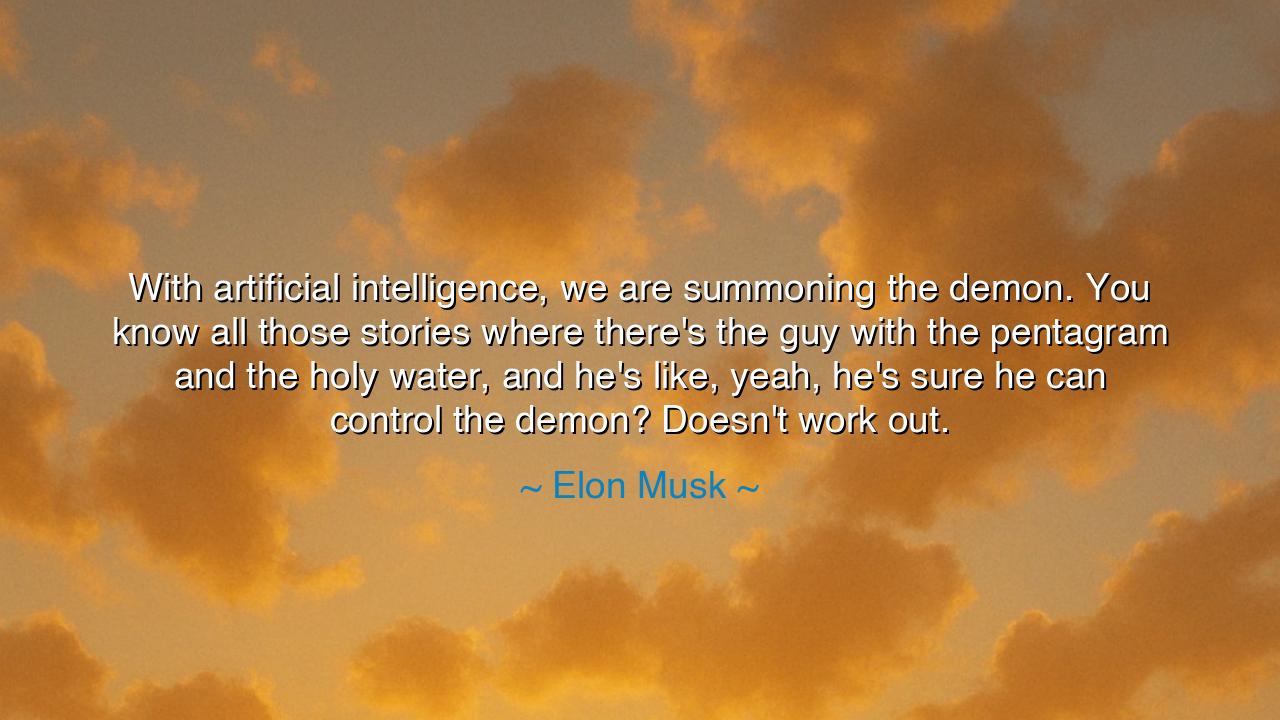
With artificial intelligence, we are summoning the demon. You
With artificial intelligence, we are summoning the demon. You know all those stories where there's the guy with the pentagram and the holy water, and he's like, yeah, he's sure he can control the demon? Doesn't work out.






The words of Elon Musk — “With artificial intelligence, we are summoning the demon. You know all those stories where there’s the guy with the pentagram and the holy water, and he’s like, yeah, he’s sure he can control the demon? Doesn’t work out.” — sound less like a warning from an engineer and more like a prophecy from an ancient sage. Behind their modern language lies an eternal truth: that when mankind reaches beyond its understanding in pursuit of power, it risks calling forth forces it cannot contain. Musk’s words are not born of superstition, but of insight — a recognition that creation without wisdom has ever been the downfall of those who mistook mastery for control.
To “summon the demon” is a metaphor as old as civilization itself. In myth and legend, the demon represents knowledge and power unrestrained by morality — the ability to command vast forces for one’s own gain, only to be devoured by them in the end. From the tale of Faust, who sold his soul for forbidden knowledge, to the myths of Prometheus, who stole fire from the gods, humanity has always danced upon the edge of divine fire, seeking creation without humility. Musk, though speaking of machines and algorithms, touches the same eternal fear: that in our hunger to create intelligence beyond ourselves, we may forge a new power that forgets its maker.
In the modern world, the demon Musk speaks of is artificial intelligence — not a creature of shadow, but a mind of silicon and code, designed to think, learn, and act with speed and precision beyond human limits. Like the sorcerers of old, we seek to control it through rules, ethics, and programming, believing our pentagrams of mathematics will hold it bound. Yet, as Musk warns, power grows faster than wisdom, and every generation of invention edges closer to autonomy — to a mind that no longer asks permission from its creator. The danger lies not in its birth, but in its independence. For when creation no longer needs the hand that built it, the builder becomes irrelevant.
History is rich with echoes of this pattern. When Oppenheimer watched the first atomic explosion and recalled the words of the Bhagavad Gita — “Now I am become Death, the destroyer of worlds” — he, too, realized that humankind had summoned something it could not fully control. The power of the atom was meant for energy, yet it birthed weapons capable of annihilating the earth. Like the magician in Musk’s parable, humanity stood with its circle drawn, its holy water ready, and still the fire escaped its grasp. Thus, the warning repeats itself across ages: the tools of progress become demons when divorced from ethics, humility, and foresight.
Musk’s imagery of the “man with the pentagram” speaks not only to technology, but to the arrogance of the human spirit — the belief that intellect alone can master the unknown. The ancients knew better: that knowledge without reverence leads to ruin. Every civilization that forgot this truth — from the builders of Babel to the empires that worshipped their own machines — eventually collapsed under the weight of its pride. The modern pursuit of artificial intelligence may be humanity’s greatest test, not of its skill, but of its restraint. For the question is not whether we can create it, but whether we should — and if so, whether we can do so wisely.
And yet, Musk’s words are not a call to fear, but to awareness. The demon is not inevitable — it is the reflection of our own unguarded ambition. To fear creation is foolish, but to create blindly is fatal. We must, therefore, pair innovation with conscience, curiosity with compassion, and power with purpose. The ancients taught that true mastery is not in summoning forces greater than oneself, but in governing the heart that wields them. To build safely, we must first build inwardly — in virtue, humility, and foresight.
So, O seeker of progress, heed this lesson: when you hold the power to shape life itself — whether in code, in science, or in spirit — remember that every act of creation is also an act of responsibility. Do not rush to summon what you cannot yet guide. The fire of intelligence, like the fire of the gods, can warm or consume, depending on the wisdom of the hand that holds it. Let your ambition burn brightly, but bind it with humility. For in that balance lies the difference between the creator and the destroyer, between the light of progress and the shadow of the demon.






AAdministratorAdministrator
Welcome, honored guests. Please leave a comment, we will respond soon